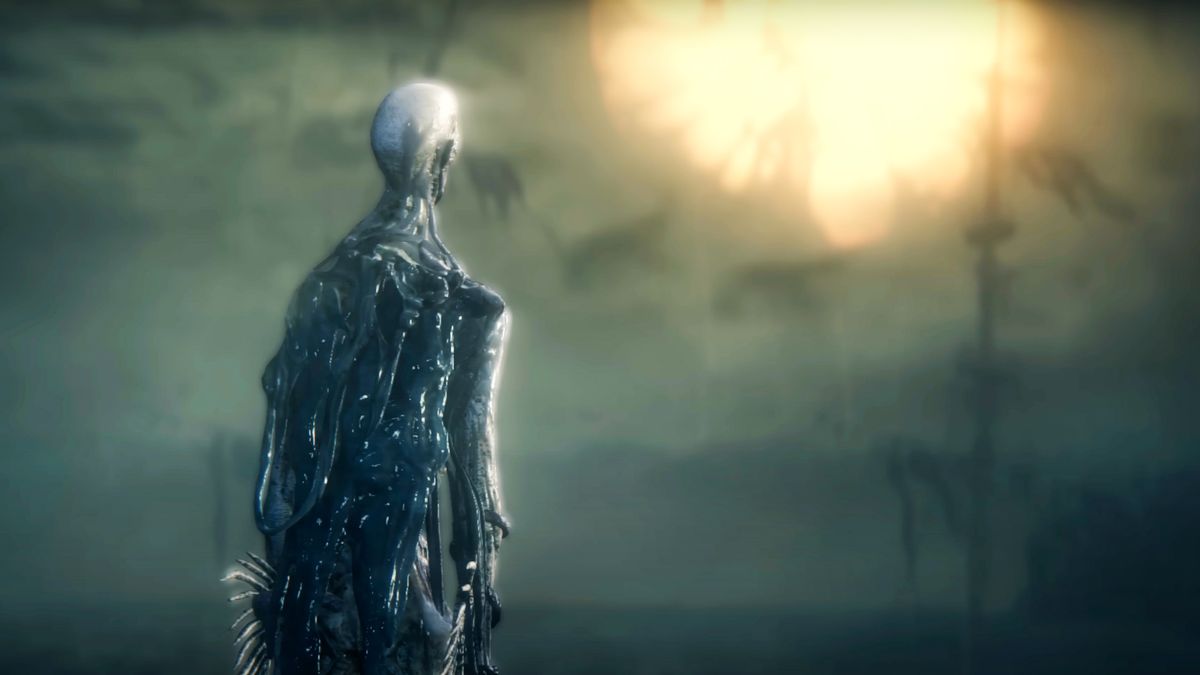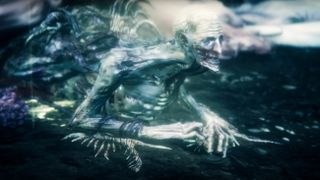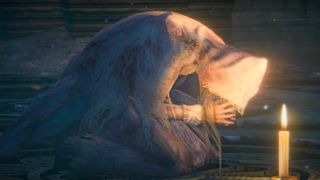With no remaster in sight because Sony hates money and also me, I'm spending Bloodborne's 10-year anniversary thinking about its hardest, perfect boss battle
Opinion | This is the age of the Orphan of Kos

The Orphan of Kos is a lost child at the end of the world, and it's all I can think about on the week of Bloodborne's 10th anniversary.
Developer FromSoftware hasn't announced – and likely will never announce – Bloodborne's mythological, 60fps remastered version. But as a serious Bloodborne enthusiast, I'm less preoccupied with that loss than I am about the mournful Orphan of Kos. He's the game's most challenging boss fight, and, I find, its most melancholy creature, which has been recently bringing me more solace than anything else.
"If you are in any way religious," the Bloodborne wiki warns, "it is also heavily advised to pray as much as possible to your god of choice for help, as killing this boss will most likely be the most painful thing you’ll ever have to do in your life."
A casual Christian myself, I once chose to heed that warning and approach the Orphan in The Old Hunters expansion with humility, sinking into my couch like a wine stain. When I witnessed the Orphan's birth – this scene triggers before the boss encounter – it felt like my living room was turning the same sardine color as Bloodborne's desolate Fishing Hamlet; I was completely immersed in its sadness. But, as I watched the Orphan shrug off chunks of its ribcage and spinal cord, I started assuming that this wrinkled thing looked far too frail to kill me.
Earlier, I had found a priest wandering, and he eulogized this tower of shriveled skin: "Ah, sweet child of Kos, returned to the ocean. A bottomless curse, a bottomless sea. Accepting of all that there is, and can be." He's a poor thing. I was sure he'd be gentle with me.
The Orphan's parent Kos, a Great One and leviathan slug, was dead when he climbed out of its soft whale skin, dragging his own placenta like a cudgel. I thought, what awful pain it must be to come from death and enter a world of death. The Fishing Hamlet – which Bloodborne scholars presume to be inspired by H.P. Lovecraft's 1936 novella, The Shadow over Innsmouth – is gray skies all the way, with steaming piles of fish laid out on the ground. Much like what happens in Innsmouth, it seems that the Fishing Hamlet's inhabitants have taken advantage of their environment, and their God, for the sake of their own individual pleasure – until there was nothing left to exploit.

Now standing on two feeble feet, the Orphan faced the cataract of the sun while gurgling, sobbing desperately. He turned to me like an insubstantial puff of dust when I started walking toward him with my Hunter Axe. Oh, poor little Orphan. Aw, he's so sad, oh, let me put him out of his misery – holy shit, he's flying at me with the force of a plane crash.
Sign up to the 12DOVE Newsletter
Weekly digests, tales from the communities you love, and more
The Bloodborne wiki wasn't kidding. The Orphan's fight is, I think, the most challenging in the game, and not only on a technical level. That said, the Orphan's ability to zoom around the map while delivering massive attacks with his own goddamn placenta certainly requires a level of confidence in combat I had not yet gained.
Emotionally, though, the Orphan fight is even more devastating. He screams as he swings around his pimply weapon, and the sound is like a scab getting torn off. He fights from his gut – or what's left of it. In his second phase, the Orphan pauses as cobweb wings sprout from his back, doubling over for a moment in what looks like pain. He's all alone and pathetic, and I felt even more so for my role in his grief.
I look back on this encounter, years after I've had it, and all I feel now is: Bloodborne was right to make me feel bad. The Orphan of Kos fight was a small, but brutal example of the kind of isolation a society that values power over love, respect, and basic empathy breeds.
The Fishing Hamlet residents leave their rotten fish in unwelcoming piles. They defiled the body of a Great One – a pregnant god, a miracle – to satisfy their own bloodlust. My hands aren't clean either. In Bloodborne, my primary role as the protagonist beast Hunter is to spill blood and consume it. As the game's premier scholar Master Willem says, "we are born of the blood, made men by the blood, undone by the blood."

But the Orphan of Kos, a shrunken angel, is a powerful counter to this philosophy. He only wreaked havoc because I gave him no choice. Otherwise, his existence proves that violence and aggression doesn't always end in an epic battle of good versus evil, despite what many other video games and some politicians suggest. More often, abuse ends in isolation. And is there anything more tragic than being both alone and angry?
When trees fall, men are selfish, and the world is dark, hate can't comfort you. That could be why, after he's killed in his boss fight, the Orphan of Kos reappears in his mother's decaying skin as just a smoky silhouette. He slouches toward the waning sun peacefully, but if you hit him once, Bloodborne alerts you, "NIGHTMARE SLAIN."
The Orphan's murky soul disperses for miles, spreading out above the sea, "accepting of all that there is and can be," a voiceover reminds us. Walt Whitman said something similar in a poem about our hometown Long Island, only a few hours south of the Massachusetts shoreline that inspired Innsmouth: "The soul / forever and forever – longer than soil is brown and / solid – longer than water ebbs and flows." I believe that peace is inevitable.

Ashley is a Senior Writer at 12DOVE. She's been a staff writer at Kotaku and Inverse, too, and she's written freelance pieces about horror and women in games for sites like Rolling Stone, Vulture, IGN, and Polygon. When she's not covering gaming news, she's usually working on expanding her doll collection while watching Saw movies one through 11.
You must confirm your public display name before commenting
Please logout and then login again, you will then be prompted to enter your display name.











